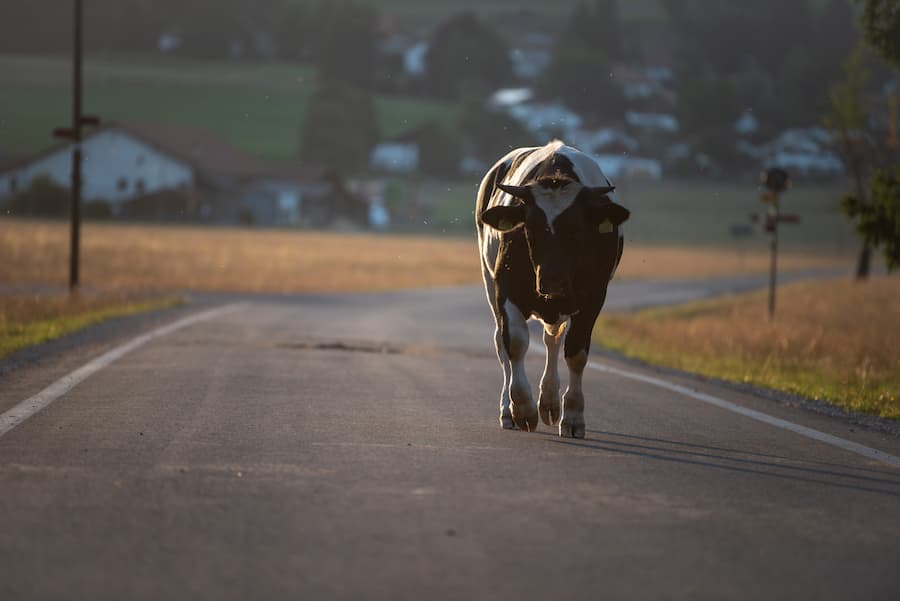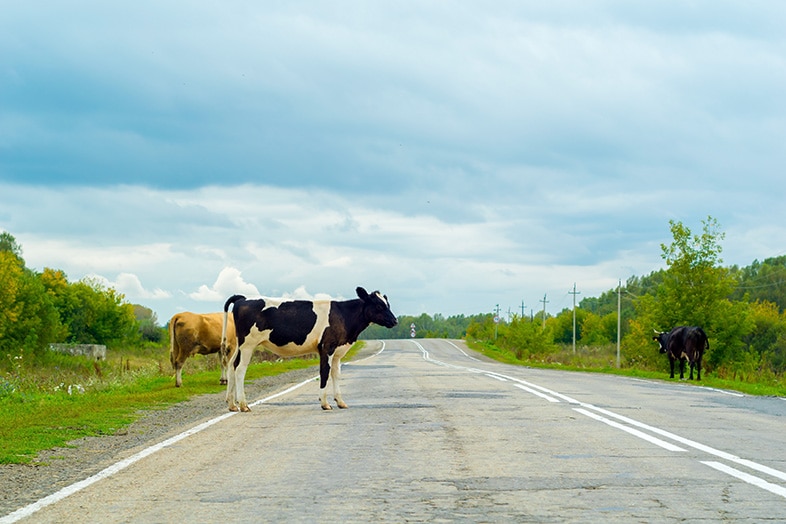In a Wisconsin, many farmers rely on their livestock to help them earn a living. Although farms and other agricultural facilities across the state must have fences to help keep livestock on their property, cows, horses, and other animals may get past these fences and onto the road.
If you encounter livestock on the road in Wisconsin, these animals generally have the right-of-way, requiring drivers to wait until they pass before proceeding. However, many drivers are unaware of the law in place to protect livestock, which can lead them to get into accidents involving livestock and, in some cases, other vehicles that stop for these animals.
It’s important to understand how the law works in Wisconsin to determine what to do in the event of a vehicle accident involving livestock. Reach out to a motor vehicle accident lawyer.
Why Livestock Has the Right-of-Way in Wisconsin

Today, trucks and trailers can transport livestock between farms and other facilities, but this wasn’t always the case. Before the convenience of modern transportation, farmers had to drive livestock on foot, putting them in the way of others on the road when crossing. As a result, farmers and their livestock had the right-of-way if they wound up on the road.
Wisconsin still has this law in place and requires drivers to give the right-of-way to livestock and farmers. The specific legislature dictating this is Wisconsin’s section regarding right-of-way of livestock, which states:
“The operator of a motor vehicle shall yield the right-of-way to livestock being driven over or along any highway but any person in charge of livestock shall use reasonable care and diligence to open the roadway for vehicular traffic.”
This law makes it necessary for motorists to stop if they see farmers or their animals crossing the road. Unfortunately, other drivers behind you may not expect you to stop, or you may not notice the animals in time to stop as they run out into the road or due to low visibility. In these cases, accidents may occur, which could make one or more parties liable if their negligence caused the accident and subsequent damages.
Who Is Liable in an Accident Involving Livestock?
If an accident involving livestock occurs, multiple parties could be at fault, depending on the circumstances. These parties could include:
Drivers Who Hit Livestock
If a driver is aware of livestock on the road but fails to give cattle or other animals the right of way, leading to an accident, the driver who hit these animals will typically be liable. Failure to stop for livestock on the road violates Wisconsin’s law, but the farmer who owns the livestock may be responsible in some cases.
The Owner of the Livestock
Although livestock has the right-of-way in Wisconsin, the law also makes it clear that livestock owners must do what they can to clear the roads for vehicle traffic. If the owner fails to take the proper steps to prevent livestock from escaping their property or otherwise fails to clear the road for vehicle traffic, they may be liable for any accidents that occur and the resulting damages.
Owners must take certain steps to prevent animals from roaming freely on the road, such as:
- Properly installing fencing that keeps livestock contained and prevents them from roaming freely
- Maintain all fencing to prevent potential wear and tear that might otherwise allow animals to easily escape
- Keep all gates closed when not in use
- Keep track of all livestock and monitor it to remain aware of animals’ locations on and around the property at all times
If a livestock owner is negligent and fails to contain livestock , drivers may build a case against the livestock owner and recover compensation for injuries and other damages sustained.
Other Drivers
Although most vehicle accidents involving livestock are single-vehicle accidents, other drivers may also be involved and potentially liable for damages.
For example, you might stop for livestock crossing the road when driving through farmlands. A distracted driver might tailgate you and, failing to notice that you’ve stopped, hit your vehicle from the rear. The force of the impact could then cause your vehicle to collide with the livestock, causing various damages and injuries.
In this instance, the other driver who rear-ended your vehicle would be responsible for the accident because of their negligence.
Recoverable Damages in Livestock Vehicle Accidents
If you are in an accident with livestock on the road, you may recover compensation from the animal owner or another negligent party if you suffered injuries and other related damages. Depending on the circumstances of the accident, you may recover certain economic and non-economic damages.
Livestock such as cows and sheep can cause serious damage to vehicles along with severe and potentially life-threatening injuries, making these accidents serious in many cases, even when they involve low-impact collisions.
Economic Damages
The main type of compensation that accident victims may recover following an accident involving livestock is economic damages. These damages are quantifiable financial losses that victims incur due to an accident and resulting injuries and property damage.
In a livestock accident case, you may recover:
- Medical bills to cover immediate and ongoing treatment
- Lost income resulting from time taken off from work to recover or because of the inability to return to work
- Lost earning capacity due to temporary or permanent partial or total disability
- Property damage, including damage to vehicles involved in the accident
- Modifications made to homes or vehicles to accommodate disabilities
- Physical therapy and rehabilitation
There may be many types of economic damages, which is why it’s often helpful to work with an attorney who can help identify and calculate them all when determining what kind of compensation you can recover.
Non-Economic Damages
In addition to economic damages, you may be eligible to receive various non-economic or general damages. While economic damages are typically easy to calculate and identify in most cases, these damages may not be as easy to prove or quantify. Non-economic damages apply to the personal experience that accident victims have following the accident while recovering from their injuries.
Accidents involving livestock can result in extensive injuries that take a long time to recover or cause disability. Subsequently, victims may experience different kinds of pain and suffering resulting from the accident.
Some specific types of non-economic damages that may account for this include:
- Physical pain resulting from injuries
- Psychological distress resulting from the injuries and the circumstances of the accident
- Trauma and post-traumatic stress disorder (PTSD)
- Disfigurement
- Loss of enjoyment of life
- Loss of companionship or consortium
If you suffer non-economic damages in a livestock accident case, you may be able to prove them by maintaining a journal that details your experience. An attorney may then be able to help calculate the total amount of compensation these damages are worth.
What to Do After an Accident Involving Livestock in Wisconsin
After an accident in Wisconsin involving livestock, there are some steps you can take to build a case against liable farmers or other parties. Of course, the first step after an accident is seeking medical attention, which can help you begin the recovery process and generate medical records.
After this initial step:
Collect Sufficient Evidence to Build a Case
Following your accident, you’ll need plenty of evidence to build a case against the liable party. If the liable party is the owner of the livestock involved in the accident, for instance, you would need to prove that the farmer’s fencing was inadequate or that another factor shows the farmer’s negligence.
If another driver is liable, you must be able to prove that the driver engaged in negligent behavior to cause the accident.
Some specific pieces of evidence in these types of cases could include:
- Videos and photographic evidence of the scene and the property used to contain livestock
- Footage of injuries and other damages resulting from the accident
- Medical records detailing the nature of injuries sustained
- Police reports
- Proof of lost income
- Witness statements from people who were present at the time of the accident
If you are unable to get any of this evidence, an attorney may be able to assist you in procuring it as needed. An experienced accident lawyer can speak to witnesses, contact the police, reach out to your doctors, and connect with other sources to obtain evidence.
An attorney may also be able to hire expert witnesses who can reconstruct the accident to show how farmers or other liable parties were negligent and caused the accident.
Adhere to Your Doctors’ Orders

After initially seeking treatment from medical professionals, it’s necessary to stick with your treatment plan. Taking any prescribed medications and adhering to the proper steps to recover can further prove the extent of your injuries. In the process, you’ll be able to generate additional medical documentation that supports your claim. Additionally, following treatment plans can help ensure you make a full recovery.
Avoid Negotiating With Insurers Before Speaking With an Attorney
Most livestock vehicle accident cases involve a single vehicle, in which case you would need to file a claim with your own insurance company after an accident. Your insurance policy may be able to cover the costs of treatment and other medical expenses resulting from the accident.
However, if the accident involved another negligent driver, you might be able to file a third-party claim against the at-fault driver’s insurance company. This could help ensure the negligent party covers the costs of damages resulting from the accident.
In any case, insurance companies may seem like they’re on your side and willing to help you get the compensation you deserve. Adjusters may make the process seem easy, straightforward, and smooth as they work to provide you with full compensation. Despite this, it’s important to remember that insurers and adjusters aren’t on your side in these cases. Instead, they want to find a valid reason to minimize the amount of compensation you receive or deny your claim.
Even if an insurer makes an offer that seems like a good deal, you may be eligible to recover a higher amount of compensation. If you accept this initial offer, you may not get the compensation you deserve. This risk is why it’s important to consider speaking with an attorney to discuss your case before negotiating with insurance companies.
Consult an Accident Attorney
Another critical step to take after getting involved in a livestock vehicle accident in Wisconsin is to reach out to a car accident attorney with experience handling these types of cases. The right lawyer will be able to work with you to discuss the options available to you regarding compensation. They will also be able to help identify the liable parties involved, including owners of livestock or other drivers involved in the collision.
Attorneys can also calculate all damages involved to determine the total amount of compensation that accident victims can receive. They may then begin negotiations with insurers to seek the full settlement amount and ensure that insurance companies don’t unfairly reduce or deny a claim.
When building a case, attorneys can also gather sufficient evidence to prove liability and the damages involved, and they may also be able to represent accident victims in court if the case goes to trial.
Contact an Experienced Lawyer to Discuss a Potential Case

Taking the right steps after a vehicle accident involving livestock may help you get the compensation you deserve if a negligent party is at fault. Speak with an personal injury attorney to learn more about your options and the steps you can take to seek compensation.
